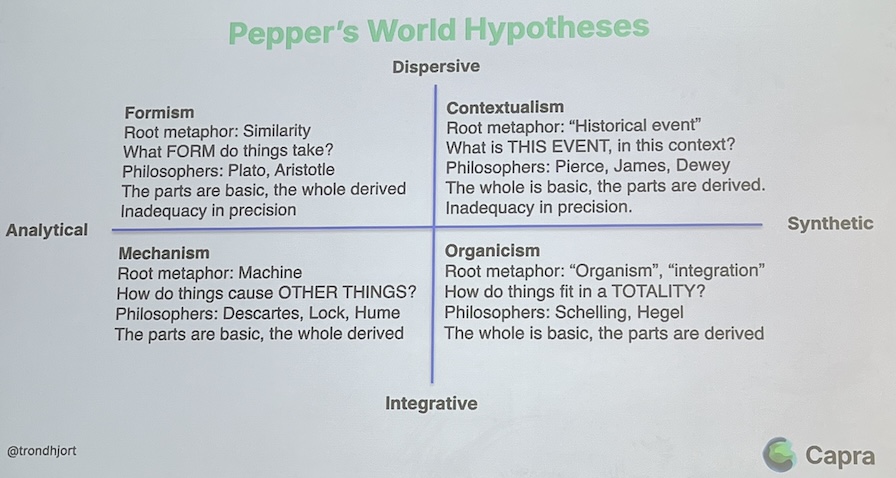We see the world through the lens of all our experiences. This is probably obvious to most, but what is probably less apparent is that we also carry a coherent mental model of how we expect the world around us to behave. A preconceived notion of what to expect in any given situation, one that even goes beyond the basic laws of nature and common human behaviour. It is so ingrained that we do not know we even have it until made aware of it. Like do you assume predictability because science assumes determinism, or do you accept unpredictability because everything is contextual?
In this talk, we will have a look at some of these lenses, called world hypothesis, and we will explore how profoundly different we interpret the world by choosing one over the other. How does it play out assuming social systems behave like machines, like when blindly copying an approach from others; or trying to create a canonical data model when all have their own context; or how about giving a team orders and designs and then expecting them to self-manage?
We shall see that the lenses are complete and should not be mixed as we constantly seem to do; to our detriment, creating massive confusion and dysfunction. Awareness of these world views and understanding their fitness in any given situation can take us a long way to make the world a better place. Imagine that.
implementing the Spotify model looks nice that is because we have a very mechanistic view of the world
=> social science
the whole goal of natural science is to get rid of the human
Pepper’s World Hypothesis

Formism
root metaphor: similarity
looking for commonality
what FORMS do things take
the parts are basic, the whole derived
inadequacy in precision
Philosophers: Plato, Aristotle
Adaptability
Mechanism
root metaphor: machine
how do things cause OTHER THINGS?
natural sciences have cheated us, they reduce everything to cause and effect
=> waterfall, delusion of control
the parts are basic, the whole derived
inadequacy in scope
Philosophers: Descartes, Lock, Hume
-> Analytical: if you understand the parts you understand the whole
Predictability
Team Topologies: Fast Flow -> mechanistic
Organicism
root metaphor: “Organism”, “integration”
a bit more vague
authority of things going on
how do things fit in a TOTALITY?
most of System Thinking is in this place
finding parts in a whole, how it effects the whole and how the whole effects the parts
Russel Ackoff, Donella Meadows are in this place
the idea is that we can model it
it’s an isolated system, it does not have an environment
system’s dynamics is all about that
the whole is basic, the parts are derived
Inadequacy in scope
Complicated model
Open model
Predictability
Philosophers: Shelling, Hegel
Contextualism
root metaphor: “Historical event”
we are defined by what we have been through
what is THIS EVENT in this context?
here we have to have the environment, because the context is so important
the Spotify model worked at Spotify because it was Spotify, it was their context, we can learn from it, not replicate
there’s a causal relation
Cynefin: Complicated vs Complex: Contextualism is Complex, all others are Complicated
DDD takes this Contextualism: domain model depend on context
the whole is basic, the parts are derived
inadequacy in precision
Philosophers: Pierce, James, Dewey
Complex model
Closed model
Adaptable
-> Synthetic, we start from the whole, by understanding the whole we understand the parts
Dispersive: they go out, there is no end
Integrative: we look at integration of things
every of these four are complete
they can explain the world
but they have limitations
Predictability (bottom) vs Adaptability (top)
Open system
system is defined by environment
environment is defined by the system
the environment changes the system and the system changes the environment
different environments:
- task environment
- global environment
=> need to be actively adaptive with planning
when we learn from environment, we cannot have a forecast, a roadmap
Merrelyn Emery, Self managing management of the self managing organisations: an update
=> Emery’s Open System Theory
Conclusion
it helps us understand why somebody believes something strongly
we can argue till the end of the world if they are stuck in a different mental model